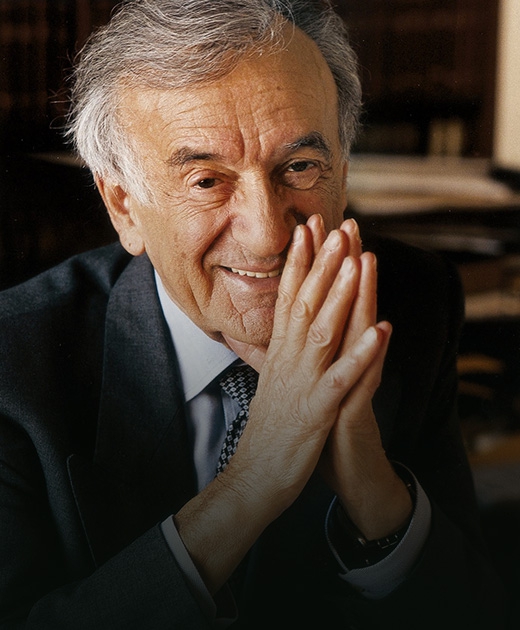Elie Wiesel
Born in 1928 / Romania
"I remember the American soldiers, the horror in their faces. I'll never forget that black sergeant. A muscular giant full of humanity, shedding tears of helpless rage, tears of shame ..."
1928
A well-known Jewish writer, political activist and Nobel Peace Prize winner Elie Wiesel was born in a Jewish Hasidic community in northern Romania in Sighet in 1928.
1944
After a short stay in a closed ghetto, in May 1944 he and his family were placed in a transport heading to the Auschwitz-Birkenau concentration and extermination camp. He was fifteen at the time. Only he and his two older sisters from the family survived. Elie's mother and his third sister died in Auschwitz, immediately upon arrival at the camp. His father, with whom he had endured hardships for a long time, died during the death march to Buchenwald. "I spent my days doing absolutely nothing. With one desire: have enough to eat. I stopped thinking about my father and my mother. From time to time, the wheel of history turned around. ”Elie Wiesel found himself in Antonín Kalina's children's block in Buchenwald, where he also experienced the liberation of the concentration camp. "I remember the American soldiers, the horror on their faces. I'll never forget that black sergeant. A muscular giant full of humanity, shedding tears of helpless rage, tears of shame: he was ashamed of the human race of which we were all part. The curses and insults he uttered turned into holy words in his mouth. ”After the liberation of Buchenwald, Elie Wiesel went to France, which offered asylum to Jewish orphans. He studied philosophy at Sorbonne and then worked as a journalist.
1955
In 1955 he moved to the United States, where he acquired the American citizenship in 1963. In the United States, he became Professor of Philosophy and Religion at New York and Boston Universities. Elie Wiesel wrote over forty novels, short story collections and essays, most of which deal with the subject of the Holocaust, looking for answers to two painful questions: How could something so frightening have happened and how can one continue to live with this incomprehensible experience? It was Elie Wiesel who first used the term Holocaust for the Nazi genocide. His famous book Night, which gained world fame and in which he described his experiences from death camps, was published in 1958. Wiesel's books did not reach Czech readers until after the fall of the Iron Curtain. The books translated into Czech are for example: The Judges, A Mad Desire to Dance, The Fifth Son, Return to Sighet, Night, Stories Against Sorrow or Dawn.
1978
All his life, Elie Wiesel made efforts to make sure that the terrible events of the Holocaust can never happen again. He considered indifference and oblivion to be the greatest danger. When US President Jimmy Carter appointed him the Chairman of the Holocaust Commission in 1978, Wiesel said its main goal was to preserve the memory, "because forgetting means killing all victims for the second time."
1986
For his activities, Wiesel won the Nobel Peace Prize in 1986 and, together with his wife Marion, founded the Elie Wiesel Foundation for Humanity. He holds a number of other prestigious awards, and together with the former Czech President Vaclav Havel, who called him the “epitome of the humankind conscience", initiated the establishment of the Prague Forum 2000.
2016
Elie Wiesel died on July 2, 2016 in New York City.
